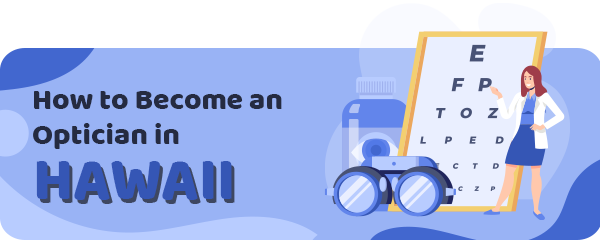Hawaii, like many other regions, has a significant population with vision impairments.
This high prevalence underscores a robust demand for opticians within the state.
If you’re interested in pursuing a career as an optician in Hawaii, explore this guide to discover the necessary steps to start this professional journey.
Article Table of Contents
Optician Job Duties in Hawaii
Selecting the perfect eyewear to suit individual needs and preferences can be a challenging task for many.
Opticians play a crucial role in assisting with this process, undertaking essential tasks to achieve this objective:
- Preparing eyewear
- Fitting and adjusting eyewear
- Providing education to customers regarding eyewear concerns and maintenance
- Maintaining sales records
- Determining insurance co-pays
- Managing inventory
- Collaborating with laboratories responsible for crafting lenses
It’s important to note that issuing prescriptions for eyewear or conducting eye examinations is not within the scope of an optician’s duties or responsibilities.
Optician Training in Hawaii
In Hawaii, opticians must obtain a license to practice, making it one of the states with this regulatory requirement.
The oversight of opticians and the issuance of licenses fall under the jurisdiction of both these institutions:
- Hawaii Board of Dispensing Opticians
- Hawaii Department of Commerce and Consumer Affairs.
Prospective opticians are mandated to complete three examinations as part of the licensure process:
- National Opticianry Competency Examination (NOCE)
- National Contact Lens Registry Examination (NCLRE)
- Hawaii Professional and Vocational License (PVL)
To obtain licensure in Hawaii, aspiring opticians can follow one of the pathways outlined below:
- Attain a high school diploma or GED and accumulate two years of relevant work experience for optician licensure.
- Complete a program for opticians from an accredited institution.
- Possess a valid dispensing optician license from another state.
Hawaii lacks local training institutions for opticianry.
Prospective opticians can opt for enrollment in accredited online programs or institutions located in other states.
Borough of Manhattan Community College 
While Hawaii may lack in-person optician training programs currently, the option to study online is available.
This community college provides a fully online course with flexible start dates and no specific enrollment requirements.
Students completing this course will be well-prepared for the ABO certification exam.
Topics covered include:
- The parts of the eye
- Refractive errors
- Strabismus and amblyopia
- Other common ocular conditions
- Prism basics
- Simple math and algebra
- Soft contact lenses
- Gas-permeable contact lenses
- Legal responsibilities and ethics
| School Name | Address |
|---|---|
| Borough of Manhattan Community College | online |
When applying to out-of-state colleges, candidates may be required to submit:
- High school diploma or GED
- Completion of specific classes with a minimum grade of C
- Two letters of recommendation
- OAT scores not exceeding 5 years
- Minimum GPA of 2.75
The duration of training courses varies, with certificates typically taking around a year and degrees requiring at least two years.
Most programs incorporate an internship, typically lasting no more than a year.
Curriculum topics covered in these programs include:
- Introduction to Optometry
- Ocular Anatomy
- Systems 1: Neuroscience
- Ocular Microbiology
- Ophthalmic Imaging
- Public Health Optometry
- Glaucoma
- Physics
For those opting for an apprenticeship, it is crucial to ensure that the employer holds a valid license as an optician, optometrist, or physician.
Certification or Licensure for an Optician in Hawaii
In Hawaii, achieving licensure involves passing two examinations.
These are:
- The National Opticianry Competency Examination (NOCE) which is administered by the American Board of Opticianry (ABO).
- The Contact Lens Registry Examination (CLRE), provided by the National Contact Lens Examiners (NCLE).
Both ABO and NCLE offer their exams at three proficiency levels:
- Beginner
- Intermediate
- Advanced
They are also available in both English and Spanish:
NOCE focuses on spectacle-related topics, including:
- Reading prescriptions
- Fitting and dispensing spectacles
- Utilizing standard ophthalmic equipment
On the other hand, CLRE encompasses subjects such as:
- Pre-fitting for lenses
- Diagnostic fitting
- Dispensing of lenses
- Delivery
- Follow-up
Each examination typically costs around $200, with employers often covering the expense.
The exams are usually conducted at Prometric testing centers, and a passing score is set at 70%.
While CLRE is specifically required for opticians working with contact lenses, many opticians choose to obtain this certification.
Optician Certification Renewal
The ABO-NCLE license has a three-year validity and mandates ongoing education for opticians.
The Hawaii Board of Dispensing Opticians’ license expires on July 1st of even-numbered years.
Opticians must renew their licenses and continue their education to stay current in their field.
Optician Salary in Hawaii
After obtaining your license, you are eligible to seek employment.
Since you won’t work for free, you should know that the median salary for an optician in Hawaii is around $55,700 per year.
In Hawaii, opticians enjoy an above-average salary compared to their counterparts in many other states.
The following table presents specific figures from the primary cities in the state.
Annual Salary Range:| Location | Avg. Annual Salary |
|---|---|
| Ewa Beach | $55,300 |
| Kaneohe | $55,300 |
| Pearl City | $55,300 |
| Waipahu | $55,300 |
| Honolulu | $55,300 |
| Kapolei | $55,200 |
| Kalaheo | $55,000 |
| Ookala | $55,000 |
| Hilo | $55,000 |
| Kahului | $55,000 |
Regional Salary in Hawaii
| Region | Employed | Avg. Annual Salary | Avg. Hourly Pay | Top 10% Annual Salary | Bottom 10% Annual Salary |
|---|---|---|---|---|---|
| Urban Honolulu, HI | 130 | $57,890 | $27.83 | $77,990 | $37,080 |
* Employment conditions in your area may vary.
Frequently Asked Questions
Where can I find work as an optician in Hawaii?
Finding work as an Hawaiian optician isn’t difficult.
Try applying at the following locations:
- Stores
- Offices
- Optometry practices
- Hospitals
- Clinics
- Centers for Low Vision Rehabilitation
- Nursing homes
- Private optician practices
What are the skills needed by an optician in Hawaii?
Opticians have the following abilities:
- Attention to details
- Good communication skills
- Adaptable to new situations
- Business skills
- Physical stamina
- Ability to perform repetitive tasks
How can I stay updated on changes to the regulations regarding opticians in Hawaii?
Many organizations change their rules and regulations.
Here are some institutions that can help you stay up-to-date with changes in the industry:
- American Board of Opticianry and National Contact Lens Examiners (ABO-NCLE)
- Commission on Opticianry Accreditation
- Hawaii Board of Dispensing Opticians
- Hawaii Optometric Association
Read the full guide: How to Become an Optician

